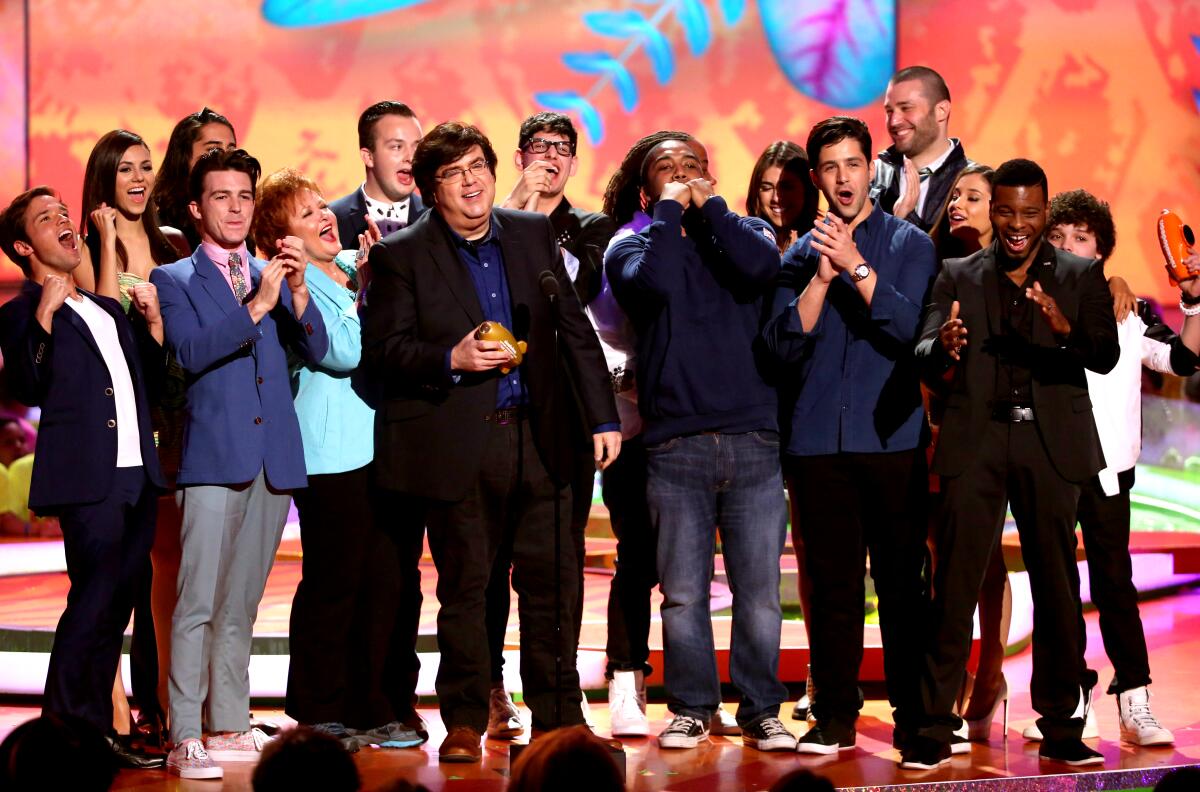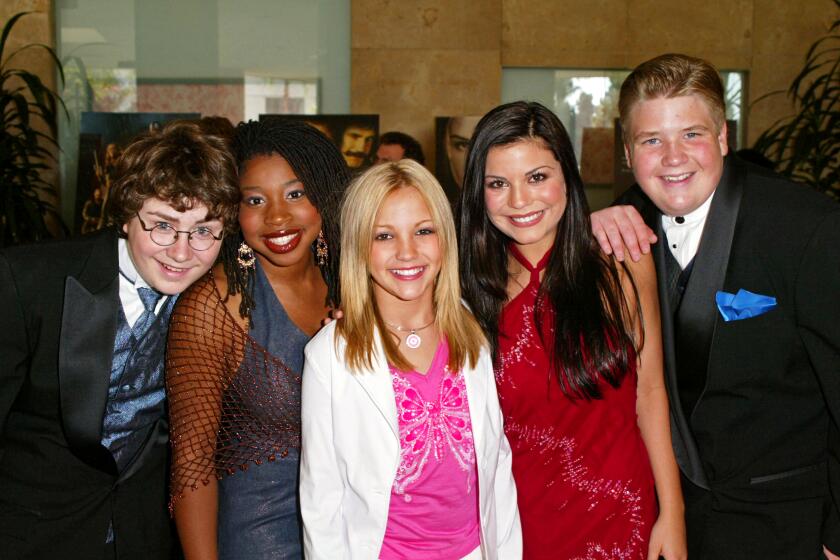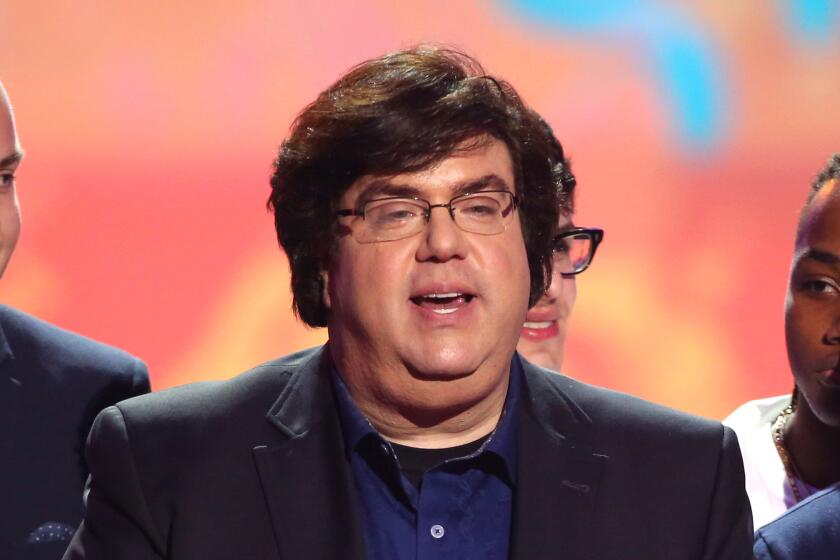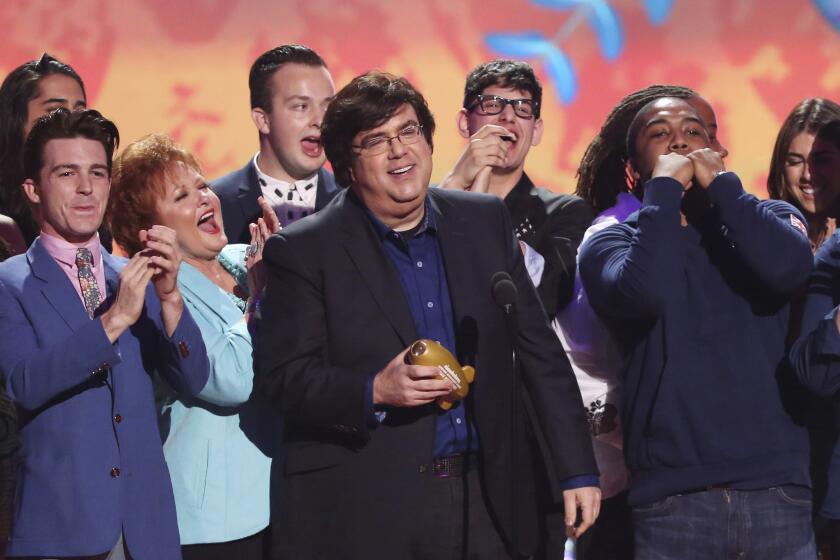‘Quiet on Set’ directors discuss ‘mind-blowing’ reaction to the series ahead of bonus episode

“Quiet on Set,” the four-part Investigation Discovery series that explores the toxic work environment on several Nickelodeon shows and the alleged abuse child stars endured while working on them, captured the attention of millions.
Following the premiere in March, many viewers who were raised on the network’s programs flooded social media with posts about the disturbing allegations brought forth in the documentary and the resurfaced clips of child actors engaging in jokes that were racially charged, had sexual undertones or were inappropriate in other ways.
Following the overwhelming response, Investigation Discovery greenlit a fifth episode of the series, titled “Quiet on Set: Breaking the Silence,” that will air Sunday at 5 p.m. Pacific; it will also be available to stream on Max. The new episode will feature previous participants, including Drake Bell; Giovonnie Samuels; Bryan Hearne and Hearne’s mother, Tracey Brown; as well as an interview with “All That” cast member Shane Lyons, who was not in the original episodes. The conversation will be led by journalist Soledad O’Brien.
The episode will continue the discussion about conditions on the sets of Nickelodeon hits like “All That,” “The Amanda Show,” “Drake & Josh,” “Zoey 101” and “iCarly,” all of which producer, writer and showrunner Dan Schneider was involved in. The series explores Schneider’s behavior and management style on the sets of these shows that interviewees described as inappropriate for children, mean-spirited and discriminatory. It also details allegations of abuse by former employees, including Brian Peck and Jason Handy, who both worked on Schneider’s shows at Nickelodeon.
Nickelodeon stars from hit shows including ‘Drake & Josh,’ ‘The Amanda Show’ and ‘Zoey 101’ spoke on ‘Quiet on Set’ about the conditions they faced as child actors. Here’s what they’re up to now.
In recent weeks, the series has seen several former Nickelodeon cast members, including Josh Peck, Kenan Thompson and Alexa Nikolas, speak out in support of Bell and other former employees featured in the documentary. Though the documentary has been well-received, the manner in which some of the interviews were obtained was recently criticized by Marc Summers, who was the host of Nickelodeon’s “Double Dare” until 1993. In a segment on the “Elvis Duran Show,” a New York morning radio show, he said he felt ambushed, a claim the directors have denied. His comments about the network, which are seen at the start of the documentary, are positive, and he says he never met Schneider.
Directors and executive producers Mary Robertson and Emma Schwartz spoke with The Times about their thoughts on the critical reception of the series and shared details about the new episode ahead of its release.
How has it felt to see this series take off and spark conversations about children in the entertainment industry?
Mary Robertson: It is mind-blowing, it is inspiring, astonishing. I could go on.
Emma Schwartz: You always do work and you hope that people will watch, people will learn, people will listen, and it’s overwhelming and gratifying to see how much people have engaged with the material, with issues beyond just the stories that we told. They really seem to be sparking a movement to engage in reexamining and potentially changing certain conditions for the world of a child actor.
Robertson: It is gratifying and inspiring to see the ways in which the reception to the film has positively impacted the people who have participated. That has been one of my favorite parts of this process.
What prompted you to want to release another episode of the documentary, and what can we expect in the bonus episode?
Robertson: When we released the trailer for “Quiet on Set,” it went viral almost immediately and questions started swirling. The trailer itself ignited a fair amount of conversation and I think it became clear to us at that point that there would be real value in engaging with some of the questions that the project was stimulating and to do so in a timely manner because it feels as though the questions themselves are evolving and changing day-to-day. It felt as though it was urgent and timely, we could bring real value there. So, we mobilized our incredible team and we engaged award-winning journalist Soledad O’Brien, who, of course, brings great intelligence and sensitivity to these questions.
In the fifth episode, we are including the account and interview with another member of the “All That” cast who was not featured in the original four episodes of “Quiet on Set.” Tracey, who’s the mother of Brian Hearne, and Brian Hearne are featured in this, as well as Gio [Giovonnie Samuels], who were all in the original four episodes. They’re sharing some very honest assessments of some of the reaction material that has been out there in the world post-premiere and bringing us into their experience in the immediate aftermath of the premiere.
Drake Bell is featured in the fifth episode, as well, and he speaks candidly to some of the responses that have been tendered online since the premiere as to why he participated originally and what the documentary has meant to him, as well. There’s also never-before-seen footage.
Schwartz: In many ways, what we began to see was that the documentary was sparking a conversation much bigger that the documentary itself and we wanted to create an opportunity in a timely fashion to continue that conversation and to create space for some of the participants to speak about that conversation that this documentary that they participated in has created.
‘Quiet on Set: The Dark Side of Kids TV’ revealed that Brian Peck received 41 letters of support from notable Hollywood figures during his 2004 sentencing, but why are they now silent?
Many former child stars who did not have interviews included in the documentary have now spoken out about their experiences at Nickelodeon. What has your reaction to these statements and comments been?
Schwartz: When you hear that other people have been holding secrets or felt not ready to share and they do as a result of seeing other people come forward, it’s really powerful to see that the project has sparked a conversation and made more people comfortable to share their stories.
Robertson: Hopefully, the project is functioning on a lot of different levels. One of those levels is that potentially, it’s creating a climate in which others who have previously felt disempowered ... now feel as though there’s an opportunity to share stories, and they will be received generously.
I don’t think we know where this conversation ends. It feels very much as if we’re in the late beginning of the response. We’re seeing a lot of folks out there in the world who are wondering what to do with the big feelings that “Quiet on Set” has stimulated. They’re feeling angry, they’re feeling frustrated, they’re feeling aghast, they’re feeling determined to do something positive with the big feelings that have swelled inside of them. We’re hearing calls for federal regulation. At the moment, there is no federal legislation that governs child entertainment. There’s a patchwork of state laws that are in place, so there’s calls from some of the participants in the project to take specific action. Jenny Kilgen, who is one of the writers featured in “Quiet on Set,” has written a public letter to SAG[-AFTRA, the actors’ union,] asking them to do more to intervene on behalf of child actors.
Schwartz: For a number of participants, one of the burning concerns that they’ve had is that there’s not a law that requires background checks for people who work on sets with children. It’s a case-by-case, company-by-company basis, and they certainly feel like that is something that should change. You’ve heard other people call for having social workers and mental health specialists working with children to offer them a space where they can express their feelings without fear of losing a job if they’re put in uncomfortable situations on sets. There continue to be other conversations and ideas that people are putting forth and it will be really interesting to see what comes out of that and where that conversation on action goes.
‘Quiet on Set: The Dark Side of Kids TV,’ the ID documentary series premiering Sunday, delves into Dan Schneider’s hit Nickelodeon shows and the abuse former employees say happened.
Did you initially reach out to some of the actors who have since spoken out about appearing in the documentary? Have any of them reached out to you directly since the release?
Schwartz: There’s definitely people who we’ve reached out to and then other people who have reached out to us since, and we continue to hear from more and more people about their experiences and experiences that they’re considering sharing. We are certainly dedicated to continuing to tell stories in that space if people have experiences that they’re ready and open to share.
Robertson: We’re committed to continuing this work. We’re committed to continuing these lines of investigation, to providing a platform and a home to those who would like to share related stories.
There has been more discussion in the media now about the abuse allegations against Drake Bell, which you touched on in the documentary. Did you feel like there was anything more to say in connection with the abuse he endured? Have you spoken to him about the documentary’s reception since the release?
Robertson: He does speak extensively about his experience of the experience, both of participating initially [in the documentary], and the reaction to the project and how that’s impacted him and how others’ response to the project — including Dan [Schneider’s] video — how that has impacted him, and the letter writers, how their responses to the project have impacted him as well.
Much of the conversation about the series is about how we need to do more to protect children on sets. What more do you think can be done? Do you think there are more safeguards for children in the industry now than there were in the ‘90s and early 2000s?
Schwartz: There’s a lot of other people who were probably more qualified and in the industry to have discussions about the particulars of what can be done. But I know in the specific case of Nickelodeon, as a result of some of the cases that we looked at in the series, they did require more background checks for people who were employed at Nickelodeon, and that is certainly a shift.
I do know, as people point out in the series, after Dan was no longer at Nickelodeon, people expressed that being on set was a happier place. That being said, I think a lot of the issues of child acting in this world that people have started to talk about are much bigger than any individual or any institution. There are questions industry wide, as I think we previously discussed, about the potential to create more safeguards in that space.
Also, quite frankly, a lot of the content that is created today, beyond traditional broadcast and film and TV, there’s a lot in the world of social media, which you see kids creating, kids on that content, and that’s also an area that has very little oversight and regulation for how kids who are working are also treated. To the extent that these experiences in the world of children’s TV can be instructive and shine a light on how children in the workplace are treated more broadly in other spaces, perhaps that is an important conversation that people are starting to look into.
More to Read
The complete guide to home viewing
Get Screen Gab for everything about the TV shows and streaming movies everyone’s talking about.
You may occasionally receive promotional content from the Los Angeles Times.










